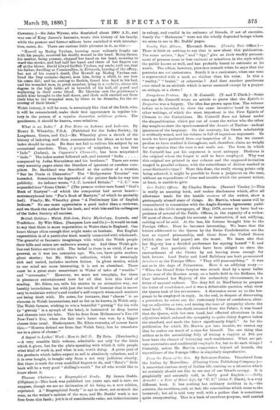Our Public Offices. By Charles Marvin. (Samuel Tinsley.)—This is really
an amusing book, aud makes disclosures which, after all allowance made for the hostile animus of the writer, show a grotesquely absurd state of things. Mr. Marvin, whose name will be remembered in connection with the Angle-Russian Agreement publi- cation in the Globe newspaper, of May, 1878, seems to have had ex- perience of several of the Public Offices, in the capacity of a writer. Of most of these, though his account is instructive, if not edifying, nothing need be said. At the last, his fortune brought him to the Foreign Office. Here he becomes interesting. We learn that the letters addressed to the Queen by the Swiss Confederation are the best as regard penmanship, and those from the United States (which also use bad paper) are the 'worst. We learn also that
her Majesty has a decided preference for signing herself " It. and I.," and that patriotic clerks have been obliged to stem the encroachment of the Crown by not leaving roam enough for
both letters. Lord Derby and Lord Salisbury are both pronounced faineants at the Foreign Office. "They will pass anything." It was not so in the days of Palmerston. Here is an edifying story :—
"When the Grand Duke Sergius was struck dead by a spent bullet at the rear of the Russian army, on a battle-field in the Balkans, the Czar informed her Majesty of the melancholy circumstance, in a letter of unusual sadness. The duty fell to MacFlartey to prepare the letter of condolence, and it was a debateable question what view the Queen took of the occurrence. A discussion arose as to the lan- guage to be employed in reply. In the end, in despair of discovering a precedent, he wrote out the customary letter of condolence, alter- ing an adjective or two, and raising the tone of sympathy above the usual level. When the draft returned from the Palace, it was found that the Queen, with her own hand, had effected alterations in the adjectives which reduced the sympathy to quite thirty degrees below the standard, and made the letter significantly frigid." As for the publication for which Mr. Marvin got into trouble, we cannot say that he makes out much of a case for himself. The one thing that
strikes us is the astonishing folly of letting a copyist at 10d. per hour have the chance of betraying such confidences. What are pri- vate secretaries and confidential employk for, but to do such things ? Certainly, unless Mr. Marvin exaggerates beyond all 'bounds, the expenditure of the Foreign Office is singularly unproductive.


































 Previous page
Previous page